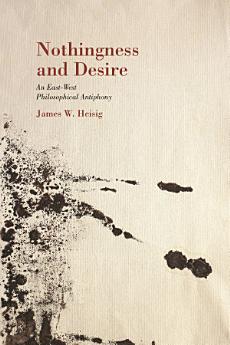Nothingness and Desire: A Philosophical Antiphony
ліп 2013 · University of Hawaii Press
Электронная кніга
200
Старонкі
family_home
Падыходзячыя
info
reportАцэнкі і водгукі не спраўджаны Даведацца больш
Пра гэту электронную кнігу
The six lectures that make up this book were delivered in March 2011 at London University’s School of Oriental and Asian Studies as the Jordan Lectures on Comparative Religion. They revolve around the intersection of two ideas, nothingness and desire, as they apply to a re-examination of the questions of self, God, morality, property, and the East-West philosophical divide.
Rather than attempt to harmonize East and West philosophies into a single chorus, Heisig undertakes what he calls a “philosophical antiphony.” Through the simple call-and-response of a few representative voices, Heisig tries to join the choir on both sides of the antiphony to relate the questions at hand to larger problems that press on the human community. He argues that as problems like the technological devastation of the natural world, the shrinking of elected governance through the expanding powers of financial institutions, and the expropriation of alternate cultures of health and education spread freely through traditional civilizations across the world, religious and philosophical responses can no longer afford to remain territorial in outlook. Although the lectures often stress the importance of practice, their principal preoccupation is with seeing the things of life more clearly. Heisig explains:
“By that I mean not just looking more closely at objects that come into my line of view from day to day, but seeing them as mirrors in which I can see myself reflected. Things do not just reveal parts of the world to me; they also tell me something of how I see what I see, and who it is that does the seeing. To listen to what things have to say to me, I need to break with the habit of thinking simply that it is I who mirror inside of myself the world outside and process what I have captured to make my way through life. Only when this habit has been broken will I be able to start seeing through the reflections, to scrape the tain off the mirror, as it were, so that it becomes a window to the things of life as they are, with only a pale reflection of myself left on the pane. Everything seen through the looking glass, myself included, becomes an image on which reality has stamped itself. This, I am persuaded, is the closest we can come to a ground for thinking reasonably and acting as true-to-life as we can.”
Rather than attempt to harmonize East and West philosophies into a single chorus, Heisig undertakes what he calls a “philosophical antiphony.” Through the simple call-and-response of a few representative voices, Heisig tries to join the choir on both sides of the antiphony to relate the questions at hand to larger problems that press on the human community. He argues that as problems like the technological devastation of the natural world, the shrinking of elected governance through the expanding powers of financial institutions, and the expropriation of alternate cultures of health and education spread freely through traditional civilizations across the world, religious and philosophical responses can no longer afford to remain territorial in outlook. Although the lectures often stress the importance of practice, their principal preoccupation is with seeing the things of life more clearly. Heisig explains:
“By that I mean not just looking more closely at objects that come into my line of view from day to day, but seeing them as mirrors in which I can see myself reflected. Things do not just reveal parts of the world to me; they also tell me something of how I see what I see, and who it is that does the seeing. To listen to what things have to say to me, I need to break with the habit of thinking simply that it is I who mirror inside of myself the world outside and process what I have captured to make my way through life. Only when this habit has been broken will I be able to start seeing through the reflections, to scrape the tain off the mirror, as it were, so that it becomes a window to the things of life as they are, with only a pale reflection of myself left on the pane. Everything seen through the looking glass, myself included, becomes an image on which reality has stamped itself. This, I am persuaded, is the closest we can come to a ground for thinking reasonably and acting as true-to-life as we can.”
Звесткі пра аўтара
James W. Heisig is a permanent research fellow at the Nanzan Institute for Religion and Culture in Nagoya, Japan.
Paul L. Swanson is a Permanent Research Fellow at the Nanzan Institute for Religion and Culture, Nanzan University.
Ацаніце гэту электронную кнігу
Падзяліцеся сваімі меркаваннямі.
Чытанне інфармацыb
Смартфоны і планшэты
Усталюйце праграму "Кнігі Google Play" для Android і iPad/iPhone. Яна аўтаматычна сінхранізуецца з вашым уліковым запісам і дазваляе чытаць у інтэрнэце або па-за сеткай, дзе б вы ні былі.
Ноўтбукі і камп’ютары
У вэб-браўзеры камп’ютара можна слухаць аўдыякнігі, купленыя ў Google Play.
Электронныя кнiгi i iншыя прылады
Каб чытаць на такіх прыладах для электронных кніг, як, напрыклад, Kobo, трэба спампаваць файл і перанесці яго на сваю прыладу. Выканайце падрабязныя інструкцыі, прыведзеныя ў Даведачным цэнтры, каб перанесці файлы на прылады, якія падтрымліваюцца.







